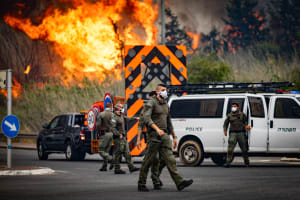‘Days of Repentance’ – Israeli overnight strikes hit Iranian military facilities, missile production sites
Israel and US hopeful the Iranian regime will end the cycle of attacks
Israel carried out its much-threatened response strikes against Iran early on Saturday morning, with over 100 aircraft striking dozens of Iranian military sites in three separate waves, according to media reports.
After the strikes concluded around 6 a.m. Israeli time, IDF Spokesman Brig.-Gen. Daniel Hagari declared, “A short while ago, our planes returned safely after striking military targets in Iran… The retaliatory strike has been completed, and its objectives have been achieved.”
“Following the directive of the political echelon, we carried out precise and targeted strikes on targets in different areas in Iran.”

“These included missile manufacturing facilities used by Iran in its attacks on the State of Israel over the past year. Simultaneously, we targeted Iran’s surface-to-air missile arrays and Iranian aerial capabilities that were intended to restrict Israel's aerial freedom of operation in Iran,” Hagari said.
“I can now confirm that we have concluded the Israeli response to Iran’s attacks against Israel. We conducted targeted and precise strikes on military targets in Iran — thwarting immediate threats to the State of Israel.”
— Israel Defense Forces (@IDF) October 26, 2024
Watch IDF Spokesperson RAdm. Daniel Hagari talk about the… pic.twitter.com/1OOss3etpV
U.S. and Israeli officials told Axios that three waves of airstrikes were carried out, with the first focused on neutralizing Iran’s aerial defenses, and the other two waves striking missile and drone bases, as well as weapon production facilities.
Most of the around 20 targets that were struck were located near the capital of Tehran and the city of Karaj.
“The targets that were struck were selected from a broad target bank – targets of various types, and we will be able to select additional targets from it and strike them if required,” Hagari warned.
Iranian authorities confirmed sites near Tehran, as well as in the southwestern provinces of Khuzestan and Elam were struck. They claimed that only limited damage was sustained and noted that investigations are ongoing.
The Chief of the General Staff, LTG Herzi Halevi, is currently commanding the strike on Iran from the Israeli Air Force underground command center in Camp Rabin (The Kirya) with the Commanding Officer of the Israeli Air Force, Maj. Gen. Tomer Bar. pic.twitter.com/HChm7XdTds
— Israel Defense Forces (@IDF) October 26, 2024
The Iranian army announced that two soldiers were killed in strikes on an air defense battery.
The massive operation dubbed, “Days of Repentance” involved over 100 Israeli aircraft, including its cutting-edge F-35 “Adir” stealth fighter jets.
The operation reportedly began with strikes on Syrian air defense radars to hide the Israeli planes on their way to Iran.
Iraqi sources reported that explosions were heard in the southern part of the country, however, it isn’t clear whether additional targets were attacked in Iraq, or if the explosions took place across the border in Iran.
A video obtained by @IranIntl_En shows an explosion near the grave of Rouhollah Khomeini, the founder of the Islamic Republic, in Kahrizak, south of Tehran. pic.twitter.com/MHimo2XD2Z
— Iran International English (@IranIntl_En) October 26, 2024
The Israeli strikes appeared to be carefully calibrated to cause significant damage to the regime’s weapon production capabilities and its ability to defend itself against future airstrikes while being limited enough to allow it to end the fire exchange.
Saturday morning, Sky News Arabic reported that the regime informed Israel through a foreign intermediary that it would not respond to the waves of attacks on its territory.
Speaking to The Washington Post, Israeli officials said they hoped the measured Israeli response to the massive missile assault some four weeks ago would end the cycle of direct blows between the countries.
An unnamed U.S. official told the WSJ that it was informed by Israel before the strikes began, but was not directly involved in the operation.
A U.S. defense official, speaking on the condition of anonymity to discuss sensitive matters, told The Washington Post that the United States was told of the Israeli strikes beforehand. The official said the United States wasn’t involved in the operation.
A senior administration official told reporters that the U.S. was optimistic the Israeli operation had been carefully calibrated to allow Iran the option to conclude the exchange.
“The president and his national security team of course worked with the Israelis over recent weeks to encourage Israel to conduct a response that was targeted and proportional with low risk of civilian harm,” he said, adding: “And that appears to have been precisely what transpired this evening.”
However, another official told Axios the U.S. expects Iran to respond to Israel, but in a limited way that would allow Israel to end the exchange.
"It is our aim to accelerate diplomacy and de-escalate tensions in the Middle East region. We urge Iran to cease its attacks on Israel so that this cycle of fighting can end without further escalation," National Security Council spokesman Sean Savett said.
Hagari stressed that Iran had already attacked Israel twice and, therefore, Israel was forced to respond. However, he noted that the IDF remains focused on its operations in southern Lebanon and the Gaza Strip and isn't interested in a fight with Iran.
“It is Iran that continues to push for a wider regional escalation,” he said. “This is a clear message – those who threaten the State of Israel will pay a heavy price. The IDF is at peak readiness, both offensively and defensively.”
“Today, we have once again demonstrated our ability to strike anywhere we choose, at any time we choose. The IDF is doing and will do whatever is necessary to protect the citizens of the State of Israel.”

The All Israel News Staff is a team of journalists in Israel.














